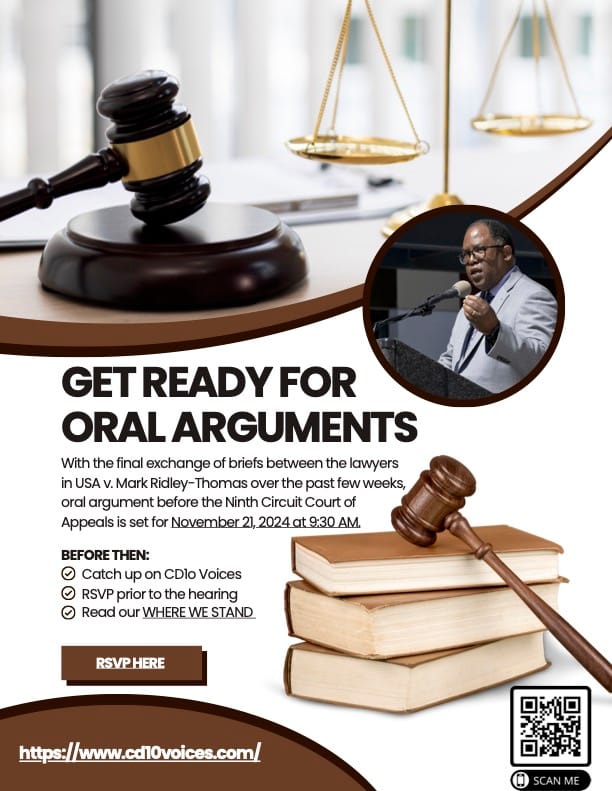LA Focus: Date Set for Oral Arguments in Ridley-Thomas Appellate Case

By Lisa Collins | October 24, 2024
With the final exchange of briefs between the lawyers in USA v. Mark Ridley-Thomas over the past few weeks, oral argument before the Ninth Circuit Court of Appellate is set for November 21.
Following months of filings, a three-judge panel will hear and weigh the arguments of government prosecutors and appellate counsel. They will decide whether: prosecutors in the United States Attorney’s Office (USAO) properly interpreted and followed the law; if the district court judge erred in deciding critical issues of law in ways that prejudiced the trial outcome and denied MRT a fair trial; and whether or not the verdict in the case should be overturned or the case remanded back to the district court for a new trial.
Attorneys for Ridley-Thomas are seeking an outright reversal of the verdict.
When the government indicted him three years ago, prosecutors alleged that Ridley-Thomas used his power to steer lucrative contracts to the USC School of Social Work and to monetize his vote. In exchange, his son, Sebastian Ridley-Thomas, allegedly received substantial benefits in the form of graduate school admission, tuition, a professorship and a $100,000 contribution to a community non-profit he was to lead.
They further asserted that Dr. Ridley-Thomas did this to protect his brand, the government said.
The jury found MRT not guilty on 12 of the 19 counts, including all the specific acts required to prove he sought the graduate school admission, tuition and paid professorship benefits for his son that were part of the “bribery” and “conspiracy” counts.
The government has been accused by Ridley-Thomas supporters of continuing to mislead the public about both the verdict and the scale of criminal conduct, maintaining that they conveniently omit the acquitted conduct on 63% of the charges they brought in order to exaggerate claims of corruption.
They argued that investigators showed unusual deference to USC. That they spoke to no contract managers and no Board of Supervisors’ staff. They subpoenaed no county records and called no county witnesses. That the contract at issue was an extension of an existing 2016 contract to provide remote mental health services for people in need and no one was pressured to support it. Further, that it was negotiated by the Department of Mental Health (DMH), not Ridley-Thomas or his office and was passed unanimously by the Board of Supervisors without comment on a consent calendar, added that at sentencing, not a single citizen/taxpayer offered a victim statement. Not even USC.
Attorneys for Ridley-Thomas believe that the U.S. Supreme Court’s Snyder v U.S. decision in July bolsters their case as it served to narrow the scope of the federal anti-corruption statute by effectively eliminating from the reach of the statute payments to state and local officials that lack a sufficient quid pro quo.
In their appellate brief, attorneys for Ridley-Thomas argued that “Snyder thus establishes that the district court erred in refusing to instruct the jury that § 666 requires a quid pro quo, that gratuities cannot be bribes (i.e., that “[a] benefit made to reward a politician for an act he has already taken or has already determined to take is not a bribe”), and that goodwill gifts are not criminal.”
As such, they contend that the district court erred in its instructions to the jury.
The government, in turn, contends that “the court did not err in declining to give an incorrect theory-of-defense instruction, and regardless, any error is harmless because the jury found a quid pro quo”.
Oral arguments will take place in Courtroom 1 of the Ninth Circuit courthouse in Pasadena.

